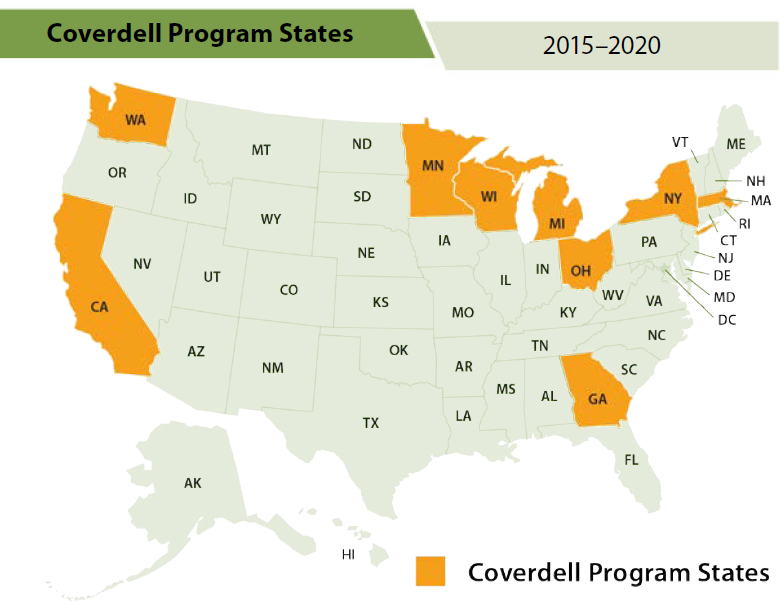PCNASP Currently Funded States
The Paul Coverdell National Acute Stroke Program currently funds nine states: California, Georgia, Massachusetts, Michigan, Minnesota, New York, Ohio, Washington, and Wisconsin.

Learn more about each of the states currently funded by Coverdell:
Published April 26, 2016
As the lead neurologist for the Coverdell Stroke Program in Georgia, Dr. Michael Frankel engages hospitals to participate in Georgia’s stroke registry. Participating hospitals better connect the continuum of care so that physicians have more information to make the right decisions every time. The data show that stroke death rates are lower in the communities served by hospitals that embrace practices supported by Coverdell.
Read success stories from current funded states:
- California Creates a Toolkit to Assess Stroke Patients After Discharge
- Georgia Standardizes Ambulance Care for Acute Stroke Patients
- A Massachusetts Team Achieves a “F.A.S.T.”-er Stroke Response
- Michigan Links Hospital and Emergency Medical Services Data
- Minnesota Advances Quality Care Through Data Collection
- New York Coverdell Program Partners with EMS to Improve Stroke Data and Patient Care
- Ohio Promotes Accurate Stroke Care Data
- Washington Coverdell Stroke Program Works with Rural Hospitals to Improve Stroke Care
- Wisconsin Sees Success in Stroke Outreach Using Community Education
- Improving Stroke Care in Nursing Homes: Massachusetts Stroke Registry [PDF-132K]
- Coverdell Success Story: Beloit Memorial Hospital [PDF-1M]
- Coverdell Success Story: Theda Clark Medical Center [PDF-178K]
- Coverdell Success Story: ProHealth Care [PDF-697K]
- Community Education that Works: Moundview Memorial Sees Success in Stroke Outreach [PDF-172K]
Why Should I Partner with the Coverdell Program?
Hospitals, health care systems, EMS agencies, and communities that partner with Coverdell benefit through:
- Improved stroke care for your patients that saves lives and prevents disability.
- Online and in-person training and resources to support your coordination with EMS and increase availability and accuracy of EMS data.
- Sharing of data and best practices between EMS agencies and hospitals.
- Assistance with data analysis and comparisons on the regional, state, and national levels.
- Improved performance on state and national stroke measures such as door-to-needle time and defect-free care.
- Reduced readmissions for stroke by focusing on post-acute transitions and secondary prevention with community partners.
- Access to training and a network of healthcare providers all motivated to improve stroke care and willing to share lessons learned.
- Recognition by state and national government and associations involved in stroke improvement.
See What Grantees Are Doing Across the Nation
- The Wisconsin Coverdell Stroke Program recently published a paper, titled “A Unique Approach to Quality Improvement Within the Stroke System of Care Utilizing Developmental Evaluation” in the April 2020 edition of Health Promotion Practice. The article highlights the importance of using developmental evaluation when working in complex systems and exploring innovations to improve outcomes, particularly in health care.
- The Michigan Coverdell Program recently developed a video to highlight F.A.S.T. and the importance of calling 9-1-1 if someone is having a stroke. The program developed the video in partnership with the Michigan Department of Health and Human Services. Check out the video.
- The Massachusetts Coverdell Stroke Program recently launched its new F.A.S.T. campaign that includes videos in English and Spanish, as well as radio spots and out-of-home materials— transit ads and billboards. For more information, visit the program’s web site. For promotional materials on stroke and a wide range of health topics, visit the Massachusetts Health Promotion Clearinghouse. To view the new videos, visit the YouTube links below:
- English: https://youtu.be/QXgH6Tinh-U
- Spanish: https://youtu.be/v044WQIvjAA
